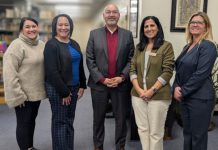The budget for Christopher High School track and field project was increased for the second time in nearly four months on March 6 – this time because a soil engineer found the site has a type of clay that expands and contracts and could cause the cement of the track to buckle.
“I’m just going to put it out there straight: We do have an issue that we did not know about,” Gilroy Unified School District Superintendent Dr. Debbie Flores said at the regularly scheduled school March 6 board meeting.
School board trustees unanimously lauded the donation of Don and Karen Christopher, owners of the Christopher Ranch garlic empire in Gilroy, who have offered to pay for the majority of an approximately $3.9 million project. But trustees were concerned that spending district money on a project that was supposed to be funded by donations will mean other district projects don’t get funding.
The discovery of troublesome soil called grey fatty clay at the site left the district with three options: pay at least $545,000 to restore the grass field, which had been partially excavated to prepare for the new track; $500,000 to haul out tons of clay and bring in better dirt; or about $300,000 to remove more than a foot of soil and mix it with lime to give the soil a texture close to concrete. School board trustees unanimously voted for the lime treatment, which was the cheapest than any of the other options, including stopping the project.
It’s the second time in nearly four months that the district has been asked to contribute to the project. In December 2013, the board was asked to contribute $303,658 in Measure P funds – the $150 million general obligation facilities bond voters passed in 2008 – so that the track could include a rubber surface instead of just the cement base that the Christophers donated.
After an extended conversation, school board trustees agreed to increase the cost of the project by $300,000 to cover lime treatment and to kick in up to $150,000 of Measure P funds. The Christopher family provided a matching donation.
“There are many other things we could do with this money, but I think this is the realistic one,” said James Pace, vice president of the school board. “Please don’t ask for more.”
Pace also thanked the Christopher family for their generous support. They will donate more than $3 million toward the athletic complex over the course of the project.
School board President Mark Good also questioned how the soil problem was not detected sooner, when there was a history of soil problems at the CHS site.
“I just want to say that we were really upset,” said Karen Christopher, wife of Don Christopher. “You guys are asking very good questions that Don and I are asking too.”













